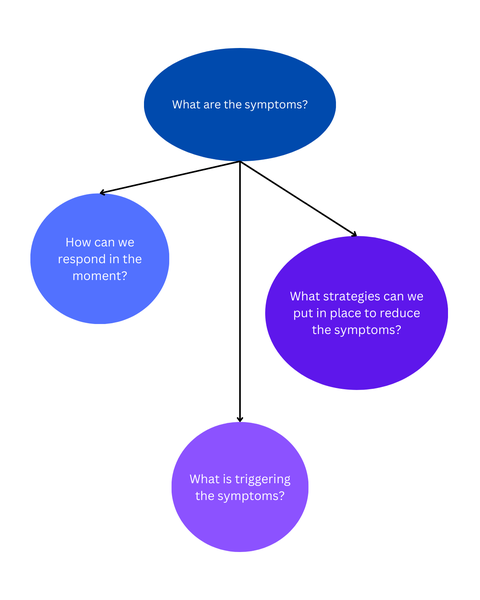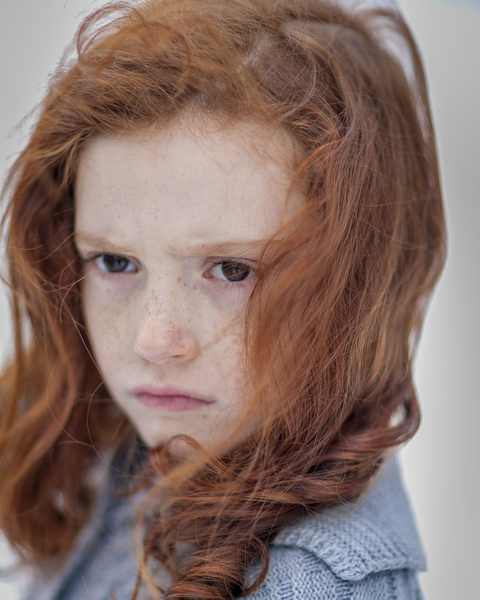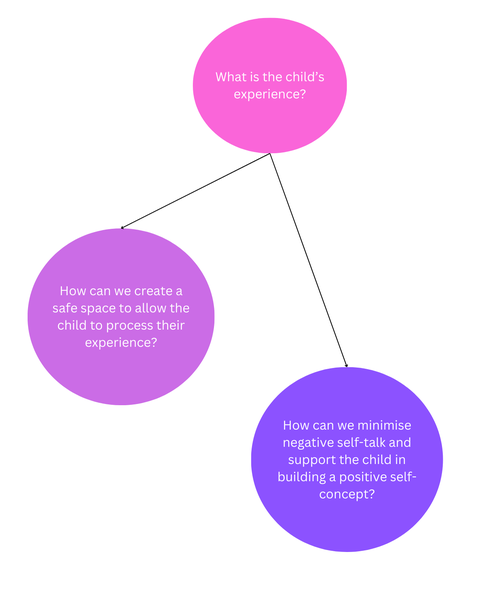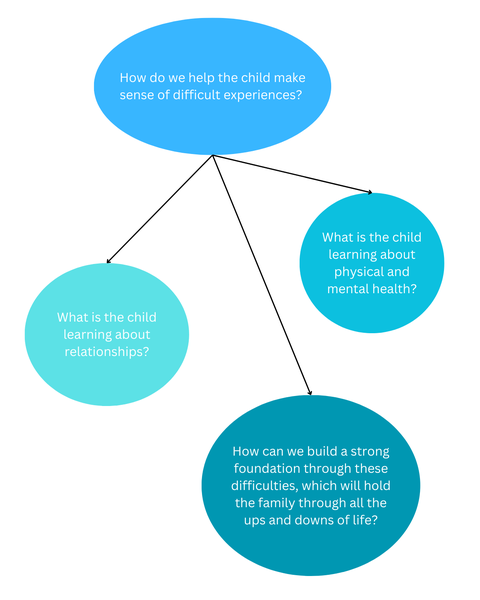BLOG:
6th September 2024
Beyond Diagnoses:
Finding meaningful answers to your child's emotional and behavioural challenges
Sometimes, knowing which questions to ask may be more helpful than having all the answers. When children struggle with emotions and behaviour, parents will often start with one question: does my child have a disorder? Let's start by having a look at what having a diagnosis actually means, and what it doesn't. And what other questions it can be useful to ask.
What is a diagnosis?
Diagnoses such as ADHD, Autism Spectrum Disorder, Sensory Processing Disorder, Anxiety and OCD are based on the presentation of certain combinations of symptoms which significantly interfere with daily functioning.
We often think of diagnoses as ‘explanations’ for behavioural symptoms, when in fact they are simply ‘observations’. They tell us that a child’s symptoms are significant and that they fit into a particular ‘pattern’ of symptoms. What they don’t tell us is why those symptoms are occurring.
A diagnosis is not a destination. It's simply a guidepost which might point you in the direction of relevant resources, therapies and other supports. But emotional and behavioural challenges are also a call to action to unravel any underlying sensory, nutritional, gut health, lifestyle and environmental factors which may be triggering or exacerbating the symptoms. And they are a call to better understand the child's experience and what you can do to support the child through relationship.

A holistic approach
If we want meaningful answers, we need to begin by asking meaningful questions. Asking questions is like peeling the layers of an onion: if we only ask one question, we only get just below the surface of the skin. We need to keep peeling back those layers to understand what we are looking at more deeply. And while that onion might initially bring you to tears, by the time you are done cooking it's likely to make your experience richer, deeper and more flavourful.
So, let's look at what sorts of questions might be helpful in our search... Perhaps we can divide our list of questions into three categories:
🧅 Peeling: unravelling what's causing the dysregulation
❤️ Feeling: understanding the child's experience
🌱 Healing: creating meaning and connection

This first set of questions is about 🧅 peeling the layers of that emotional and behavioural onion. What is really going on?
🧅 What are the symptoms?
The most obvious symptoms are likely to be the ones which interfere with everyday functioning: these might include frequent meltdowns or explosive reactions, difficulties with transitions, anxiety, hyperactivity etc.
Are there also physical symptoms which form part of the picture? Does the child have stomach aches or other GI symptoms, pale skin or bags under their eyes?
🧅 How can we respond in the moment?
If we can remember that behaviour is a way of communicating (and not an attempt to seek attention or manipulate us!) then we can be considered about what we are communicating in response. We can be conscious of helping the child to calm so they can regain their emotional balance.
🧅 What strategies can we put in place to reduce the symptoms?
Creating supports and scaffolding can help the child to succeed and develop confidence in their own abilities - whether that be in the classroom, to make friends or in day to day living.
🧅 What is triggering the symptoms?
Let's look a little deeper here. At first, we might think a challenging behaviour was triggered by - for example - the child 'not getting their way'.
But as we dig deeper, we might realise that the child was already feeling 'out-of-sorts' and that this set the scene for the challenging behaviour. We could create some strategies to help the child 'reset' so they are feeling better and are therefore more capable of managing their emotions when things don't go their way. As parents, we can up-skill to gain clarity and confidence about how to manage challenging situations to help the child to retain or regain their emotional equilibrium.
And as we dig deeper still, we might find that nutritional, environmental or other factors are impacting the child's nervous system. Sometimes, making the right dietary or lifestyle change, resolving a sleep disturbance or identifying and removing an environmental toxin can have a profound effect on a child's emotions and behaviour. It's very important to investigate what might be interfering with the child's emotions and behaviour and try to resolve the root cause.
These are really important questions to be asking, as they have the potential to create significant change. But they still aren't the only questions to be asking!
The Child's Experience
When children struggle with their emotions and behaviour, we also want to ask ourselves:
- what the child is experiencing
- how they are interpreting that experience.
It is through our relationship with the child that we can help them make sense of their experience. We want to support them to develop insights that will help them now and with any challenges they may face going forward.
Of all these insights, the most important is: that they are worthy of love.


This next set of questions relates to what the child is ❤️ feeling and how to help them process their experience in a positive way.
❤️ What is the child's experience?
It's often a tumultuous one. The emotional dysregulation at the heart of the problem is in itself distressing for the child. Added to that is the experience that they are not meeting the hopes and expectations of the people they treasure the most in the world: their parents, teachers and caregivers.
❤️ How can we create a safe space to allow the child to process their experience?
Our children's challenging feelings and behaviour can bring out a storm of emotions in us as parents. Frustration, embarrassment, self-doubt, impatience, anger, concern for the future... In order to be available to the child, it's important for us to process our own feelings. This may be easier said than done!
When we are calm, it enables us to create an emotionally safe space for the child. Our aim is to be present and listen without judgement or agenda; to accept and show compassion for the child's feelings; and to mirror our understanding of their experience back to the child. Feeling understood helps a child to calm, to process their experience and to learn how to manage their emotions.
❤️ How can we minimise negative self-talk and support the child in building a positive self-concept?
The first thing to remember is that our attitude towards the child will be internalised and form the core of their attitude towards themselves. Approaching the child's challenges with compassion and looking for moments of connection gives the child the experience that they are worthy of love.
Being mindful of acknowledging the child's qualities and accomplishments - instead of praising and criticising - are also important. For example, we might reflect "I noticed that you were able to calm down even though you were so disappointed that you couldn't get that lolly at the supermarket. I really appreciate how flexible you were in accepting the apple I offered you instead." This makes the child feel valued and gives them confidence in their ability to be flexible and regulate their feelings, rather than feeling good about themselves when they do well and bad about themselves when they fall short.
Creating Meaning: 'The Obstacle is the Path'
Let's approach these challenges as we would any other tough moments on life's rich journey, by looking to draw meaning from the experience, create a deeper connection with each other and learn life lessons which will be invaluable through all the ups and downs of life.


This set of questions is about 🌱 healing - by creating connection and meaning from life's challenges.
🌱 How do we help the child make sense of difficult experiences?
It might seem to the child as though they are the only one struggling with things other children take in their stride. Letting your child know that there are lots of kids with similar challenges - and that every person sometimes encounters challenges - can be helpful. You can talk about the qualities that help us get through hardship - patience, perseverance, inner strength, connection with others... and how you can see your child developing those qualities which will help them throughout their lives.
🌱 What is the child learning about relationships?
When we are able to stay connected and compassionate with our children when they are struggling with their feelings and behaviour the most... well, you might call that 'unconditional love'. By accepting our children as they are and being there with them to navigate this tricky terrain, they learn that relationships are about sticking together. They learn that relationships can see you through the tough times. And that it's the tough times that bring you closer.
🌱 What is the child learning about physical and mental health?
Is the child learning that there is something wrong with them? Or are they learning that everybody sometimes struggles and that everybody sometimes feels unwell - whether that be a physical illness or difficulties with regulating their emotions. We can show our children that they don't need to be perfect to be loved and that it's not necessary to be invincible. We can teach them healthy strategies for dealing with emotional upset including listening to their bodies and feelings, having self-compassion and talking about their experience. They can learn that physical and mental health are interrelated and that healthy food and lifestyle choices can have a huge effect on their emotional experience. They can learn that mental and physical health deserve as much respect as each other. We don't do a great job of upholding this equal respect in our society and I think we can do better. Let's be the change we want to see!
🌱 How can we build a strong foundation through these difficulties, which will hold the family through all the ups and downs of life?
By not interpreting these challenges as the 'child's problems' which need to be 'fixed' but as one of life's many challenges, we become the heroes of our own story. We can face up to these challenges, handle them with integrity, learn to navigate their complexity and come out stronger, closer and healthier!
I hope these questions and ideas have been helpful to you.
If you would like some support in finding answers to help your child, please reach out. The easiest way is to book in a free introductory session to talk through your situation and decide whether coaching might be for you. I’d love to chat with you!
With warm regards,
Nicki